G20 – Disability-20


G20: National Council of and for Persons with Disabilities (NCPD)
effectively advocate for the inclusion and active participation of persons with disabilities in the G20 discussions
South Africa will lead the Group of Twenty (G20) from 1 December 2024 until 30 November 2025. The country has adopted as the theme for its G20 Presidency: Solidarity, Equality, Sustainability. South Africa took over the presidency from Brazil after their summit in Rio de Janeiro from 18–19 November 2024, and will hand over the presidency to the United States of America on 1 December 2025.
The G20 is the premier forum for global economic cooperation and global governance on important issues affecting the world. It is widely regarded as a vehicle for promoting effective multilateral cooperation as it brings together the world’s leading economies to ensure global economic stability and sustainable growth for all nations.
In advancing the theme, South Africa will emphasise collective efforts to ensure a fair global order that meets the needs of the present while considering the future of our world and generations to come.
This will be the first time an African country hosts the prestigious gathering, which brings together leaders and policymakers from major economies. President Cyril Ramaphosa has committed to placing Africa’s development at the top of the agenda when hosting the G20 in 2025.
South Africa’s assumption of the presidency of the G20 provides a platform for our country to highlight the instrumental role of Africa and developing nations in tackling the globe’s socio-economic issues. South Africa will use this forum to highlight the interests of Africa and the developing world, as well as achieve lasting solutions to challenges faced by developing countries across the world.
The G20 comprises 19 countries (Argentina, Australia, Brazil, Canada, China, France, Germany, India, Indonesia, Italy, Japan, Republic of Korea, Mexico, Russia, Saudi Arabia, South Africa, Türkiye, the United Kingdom, and the United States), the European Union, and since 2023, the African Union.
The main element of the logo for South Africa’s G20 Presidency represents the King Protea, which holds a special place in the hearts of South Africans, as the national flower of the country. It embodies resilience, cultural pride, hope and natural splendour.
The semi-circular design, symbolises unity, inclusion, and global collaboration.
South Africa’s national colours (green, gold, black, blue, red, and white) are prominently displayed, representing the country’s diverse heritage and cultural vibrancy.

The theme guides the priorities of the Working Groups in both the Sherpa and Finance Tracks and also informs the High-Level Deliverables of South Africa’s G20 Presidency.






As South Africa prepares to host the G20 in 2025, the global disability community stands at a pivotal moment. Historically, disability inclusion has been notably absent from global platforms, including the G20 and its civil society engagement platform, the C20. Despite the G20’s influence in shaping international policy on economic and social development, the perspectives and rights of over one billion persons with disabilities worldwide have remained on the margins. Representative organisations of persons with disabilities (DPOs) have long struggled to gain access to these platforms. Barriers such as inaccessibility, limited resources, and the absence of formalised inclusion mechanisms have prevented persons with disabilities from engaging in global governance processes that directly affect their lives. In 2024, the Instituto Jô Clemente (IJC) in Brazil made important progress during the G20 Brazilian presidency by launching the Disability-20 (D20) initiative, a strategic effort to place disability on the G20 agenda. This initiative brought visibility to disability rights, laying the foundation for continued engagement. However, these gains must now be expanded and institutionalised. With South Africa assuming the G20 presidency in 2025, there is a unique opportunity to solidify and elevate the D20 initiative. The National Council of and for Persons with Disabilities (NCPD), alongside Disabled People South Africa (DPSA) and other partners, seeks to advance this work. The D20 in South Africa is positioned to amplify the voices of persons with disabilities, ensure their meaningful participation, and drive inclusive policy change across the G20.
Despite progress in 2024, significant challenges remain. The D20 initiative led by IJC in Brazil highlighted how disability issues, while acknowledged, were still weakly integrated into the C20’s final policy packs and the G20’s communique. This limited visibility hindered the potential for concrete and sustained action. In the South African context, the challenge is further compounded by structural inequalities, resource constraints, and systemic barriers to inclusion. Many Organisations of Persons with Disabilites (OPD)/Disabled Peoples Organisations (DPOs) operate without the logistical and financial means to participate effectively in global platforms.
Without deliberate efforts to mobilise and support these organisations, there is a risk of losing the momentum generated in Brazil. This situation calls for a renewed commitment to mobilisation, participation, and advocacy. It demands deliberate strategies to empower DPOs, build capacity, and embed disability inclusion in all G20 processes, so that engagement is not symbolic, but transformative.
The Disability-20 initiative in South Africa seeks to continue the momentum established in Brazil and integrate disability inclusion into the core of the 2025 G20 agenda. The key objectives are:
The Disability-20 initiative aligns with the G20 South Africa 2025 theme of “Solidarity, Equality and Sustainability”, which emphasises:
The Disability-20 aims to operationalise this vision by ensuring that disability leadership and expertise contribute directly to G20 policy development and implementation.

To facilitate the D20 process in South Africa, the NCPD and DPSA have established a cooperative working relationship, reflecting shared values and a joint commitment to inclusive global governance. Both organisations represented South Africa in the D20 process in Brazil and have continued this partnership in preparation for 2025. This collaboration is deliberately inclusive. It welcomes other OPDs/DPOs and individual activists, recognising that broad participation is essential to strengthening the voice of the disability community.
The approach is guided by the following principles:
To ensure inclusive facilitation and comprehensive engagement, thematic workstream areas have been divided between NCPD and DPSA as follows:
NCPD Focus Areas:
DPSA Focus Areas:
Each organisation will, within its allocated workstream areas, lead on research and policy drafting, facilitate and enable stakeholder engagement and participation and oversee the presentation of their workstream outcomes at the D20 Conference.

Project Lead
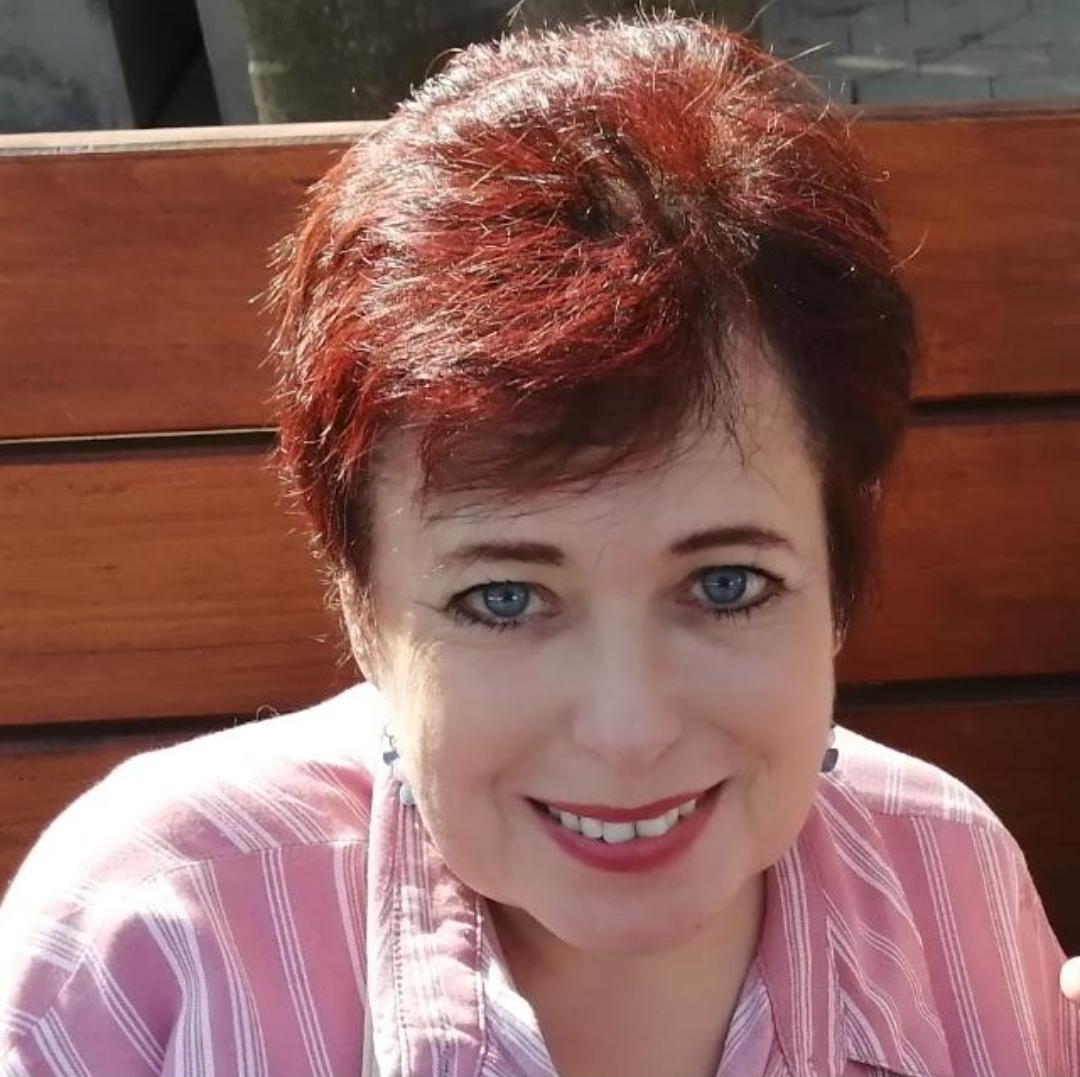
Secretary
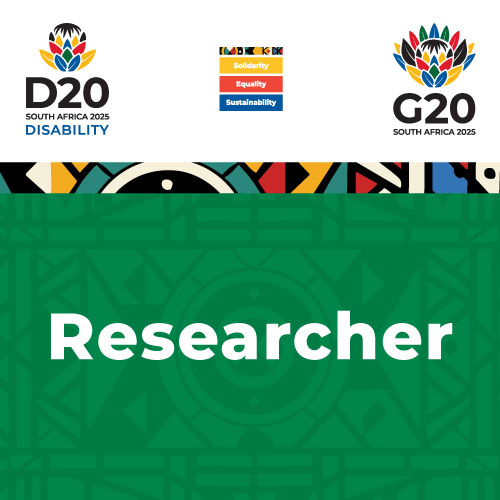
All Workstreams

Legal

Financial

Lived experiences

Inclusive Education

Employment and Economic Participation

Accessible Tourism

Digital and Inclusive Economies

Poverty Alleviation and Food Sustainability
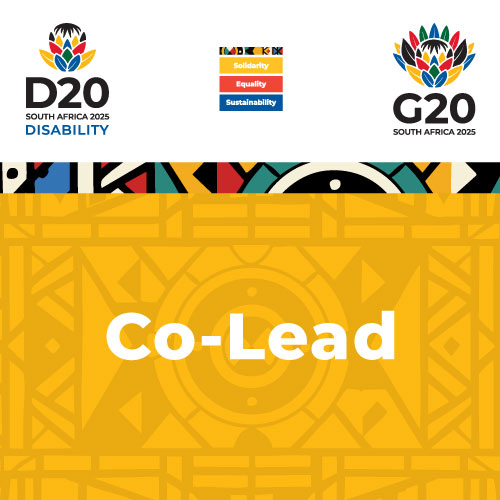
Inclusive Education
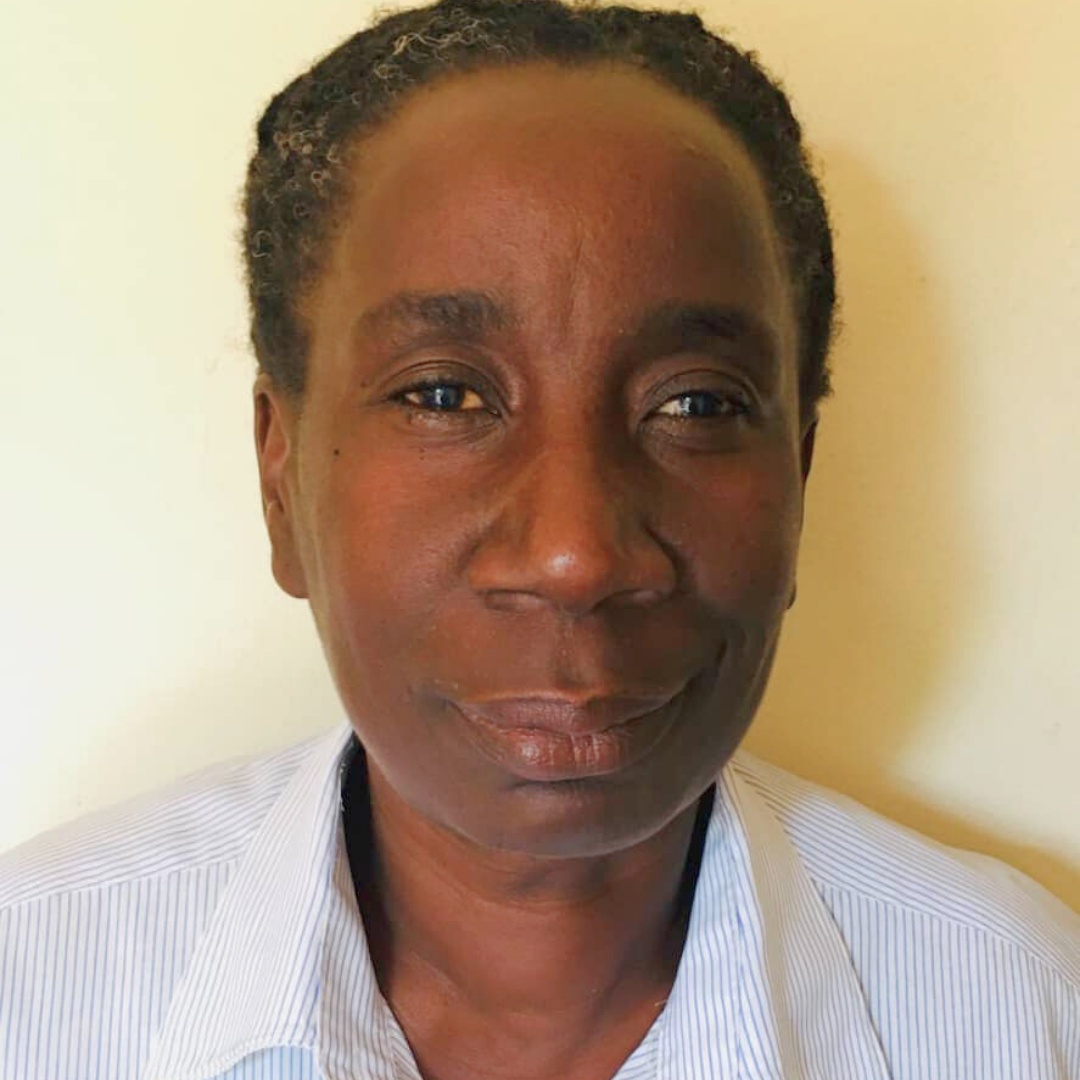
Inclusive Education

Inclusive Education
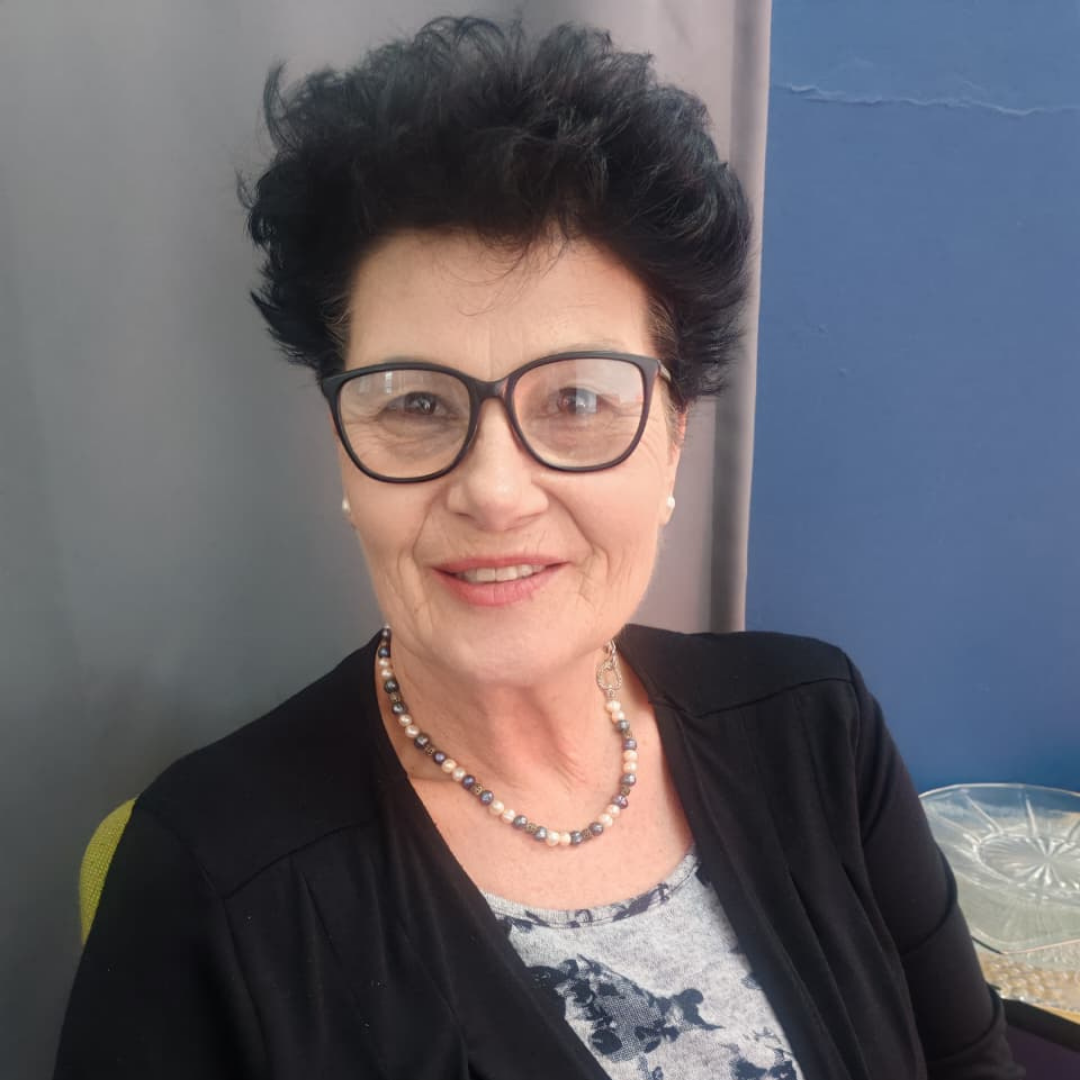
Employment and Economic Participation

Employment and Economic Participation

Employment and Economic Participation

Employment and Economic Participation

Accessible Tourism

Accessible Tourism

Accessible Tourism

Accessible Tourism

Digital and Inclusive Economies

Digital and Inclusive Economies

Digital and Inclusive Economies

Poverty Alleviation and Food Sustainability

Poverty Alleviation and Food Sustainability

Poverty Alleviation and Food Sustainability
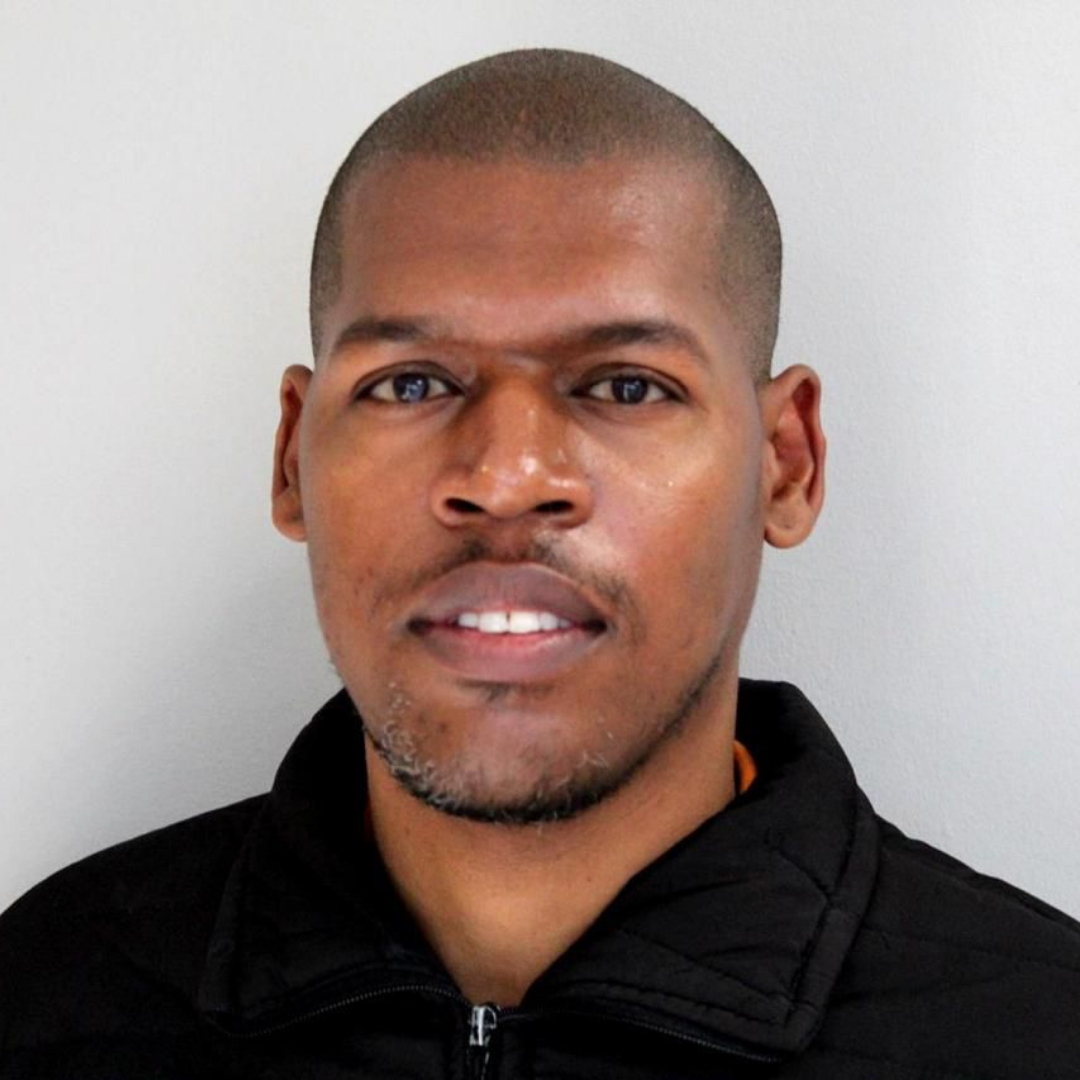
Poverty Alleviation and Food Sustainability

The Disability-20 Conference is the flagship event of the initiative. Co-hosted by NCPD and DPSA, it will:
A Disability-20 Secretariat was established and is supporting with planning, coordination, budgeting, and delivery of the conference, ensuring full accessibility and sector-wide participation. If you or your organisation is interested in shaping this event as a member of the Conference Steering Committee, please get in touch with either NCPD or DPSA.
The Disability-20 initiative includes coordinated advocacy, communications, and policy engagement, including:
The D20 initiative represents a crucial opportunity for South Africa to lead globally on inclusive development. Through strategic coordination, inclusive participation, and robust policy advocacy, the D20 will ensure that persons with disabilities are no longer peripheral but central to the G20’s vision of solidarity, equality, and sustainability. In doing so, South Africa’s G20 presidency will set a new standard for global governance, one that is truly inclusive and leaves no one behind.
Day 1 opened with accessibility check-ins, followed by a warm welcome from Dr Ashley Subbiah, Chair of the Disability-20 Steering Committee. From the outset, accessibility, dignity, and participation framed the experience.
Prof Juan Angel De Gouveia (IDA) reflected on the global journey “From Rio to Johannesburg,” situating the D20 within a growing international movement.
Minister Sindisiwe Chikunga (DWYPD) delivered the keynote address, affirming South Africa’s commitment to centring disability inclusion during its G20 Presidency.
Dr Zukiswa Nzo (C20 Apex Leadership) outlined the vision for the D20 process within the global theme of Solidarity, Equality, Sustainability.
Dr Erna van der Westhuizen introduced the 2025 D20 Declaration, emphasising equality, inclusion, and full participation.
Throughout the day, delegates engaged in rich dialogue across five major thematic pillars:
Day 1 closed with a unified understanding: South Africa’s disability sector stands ready to lead globally, grounded in evidence, community wisdom, and lived experience.
Day 2 built on the momentum of Day 1, moving from insight to action.
After accessibility check-ins, Dr Ashley Subbiah opened the day, followed by a stirring address by Dr Siva Moodley, calling for universal inclusion across education, employment, health, governance, and data.
Moderated by Mirriam Nthenge (IDA), this high-level panel highlighted how each G20 presidency can sustain disability inclusion year-after-year.
Panelists included:
Lara Souto Santana – Brazil D20
Lubabalo Mbeki – South Africa
Marcie Roth – USA OPDs representative
Idris Maida – African Disability Forum
Their discussion reaffirmed the necessity of continuity, cross-border collaboration, and accountability.
Moderated by Professor Jacqueline De Matos Ala, leaders from DPSA, NCPD, SADA and organisations for the rights of children with Disabilities reflected on advancing a unified South African disability voice within the G20 architecture.
In an emotional and symbolic ceremony, the 2025 South African Disability-20 initiative was formally handed by Ms Alex Msitshana (NCPD Chairperson) to Marcie Roth as representative of the USA disability sector.
This moment sealed a shared commitment to strengthening disability representation across future G20 presidencies.
Dr Ashleigh Subbiah, Chair of the Disability-20 Conference Steering Committee, offered the vote of thanks and brought a formal close to the 2025 South African Disability-20 Conference.
The NCPD Board and Executive Management proudly recognize the exceptional contributions of Andrew Hofmeyr, Alex Msitshana, and Lubabalo Mbeki in advancing the Disability-20 (D20) initiative. Andrew led the 2025 project with remarkable dedication and impact, navigating uncharted territory while keeping inclusion and dignity at the forefront. Alex played a pivotal role in enabling the South African D20 process through strategic partnerships, culminating in the historic handover of the declaration to the American DPOs for 2026. Lubabalo ensured seamless project management and resource enablement from Brazil in 2024, carrying the baton for South Africa with strategic focus and commitment until the final moment. Their leadership and dedication exemplify the spirit and mission of the NCPD.
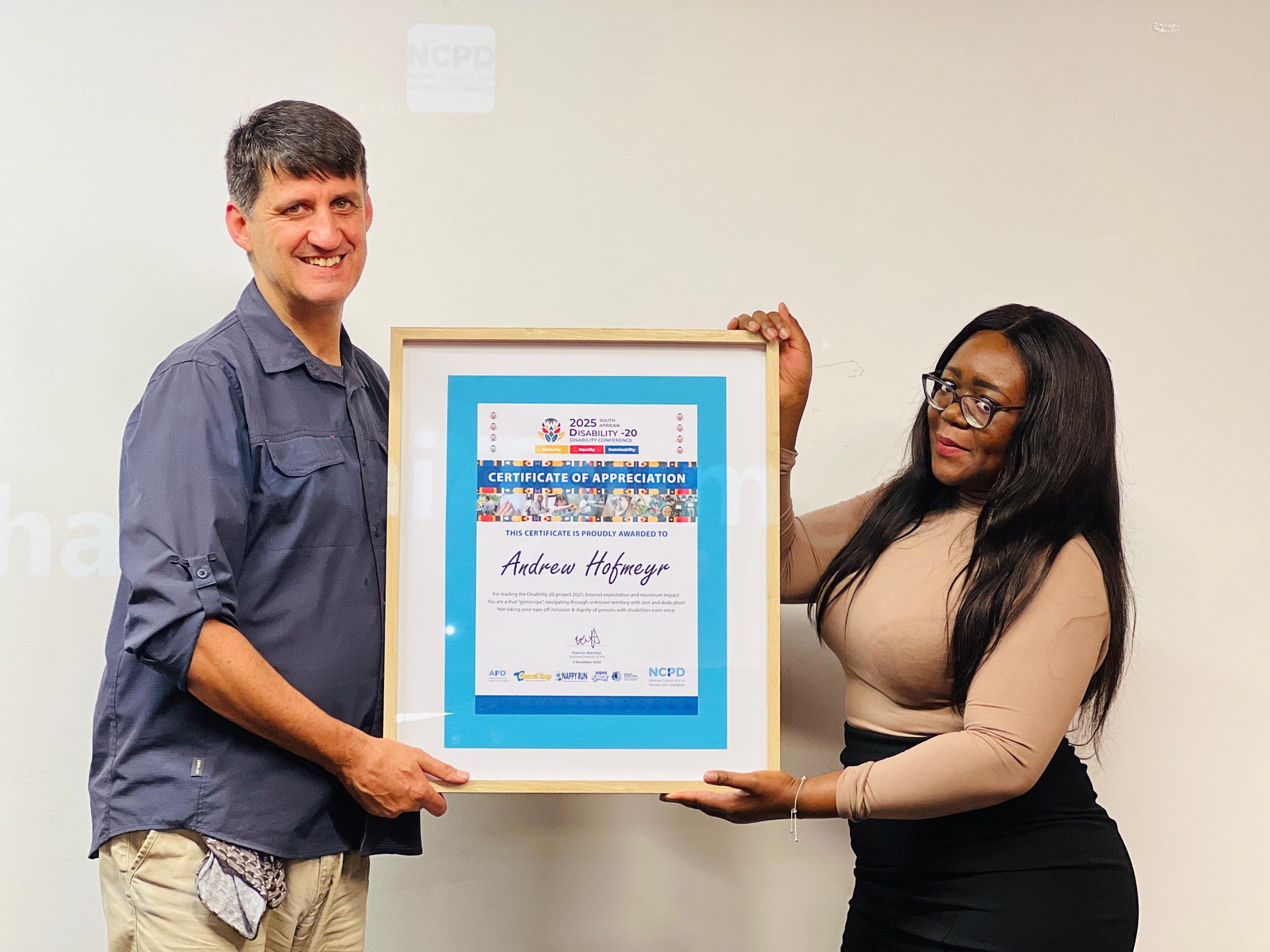
For leading the Disability-20 project 2025; beyond expectation and maximum impact. You are a true “gyroscope”, navigating through unknown territory with zest and dedication! Not taking your eyes o inclusion & dignity of persons with disabilities even once.
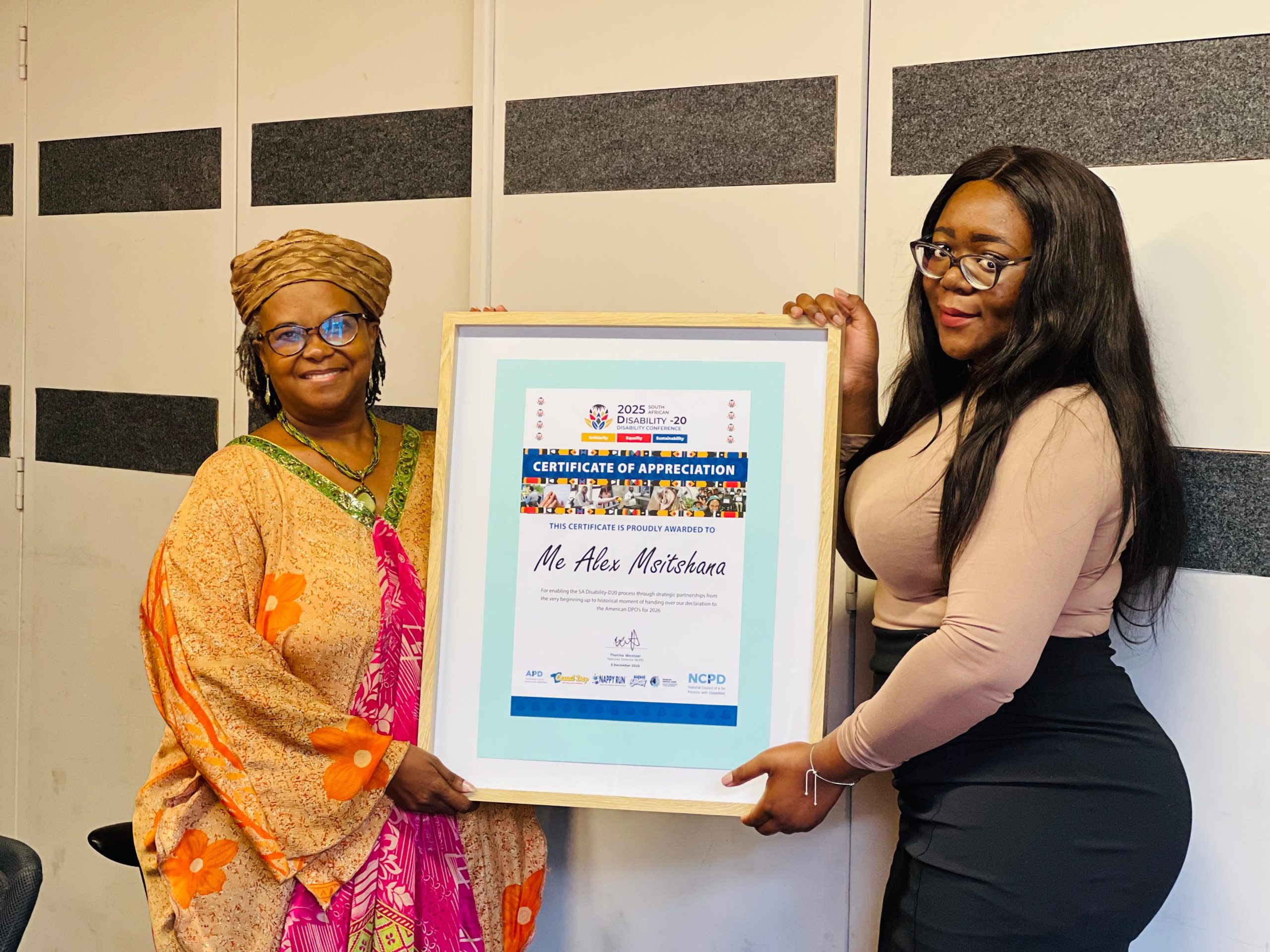
For enabling the SA Disability-D20 process through strategic partnerships from the very beginning up to historical moment of handing over our declaration to the American DPO’s for 2026
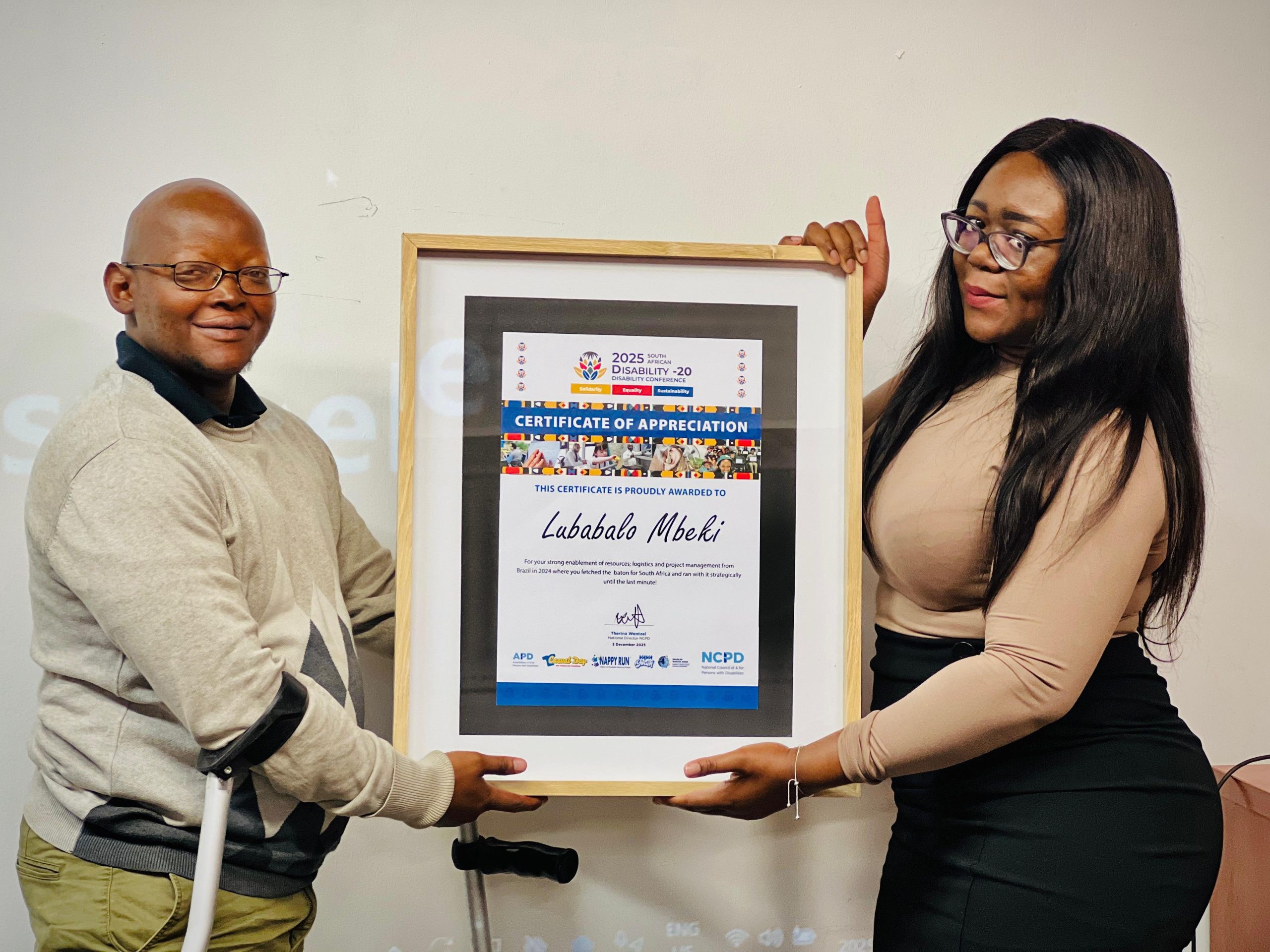
For your strong enablement of resources; logistics and project management from Brazil in 2024 where you fetched the baton for South Africa and ran with it strategically until the last minute!

Lubabalo Mbeki joined SAFM’s Weekend Breakfast Show, produced by Zanele Mahatle, for a powerful conversation on the D20, the Disability Engagement Group to the G20. Representing the National Council of and for Persons with Disabilities (NCPD), Lubabalo highlighted South Africa’s leadership role in the global disability inclusion movement and the importance of ensuring that the voices of persons with disabilities are central to G20 policy discussions. The interview explored how the D20 aims to influence meaningful change ahead of the 2025 Summit.
🎧 Listen to the full interview (part 1 & 2):


Listen to Professor Maximus Monaheng Sefotho on Lesedi FM as he unpacks the importance of disability-inclusive education in the context of the G20. In this insightful interview, Prof. Sefotho explores why inclusive education is critical for sustainable development, how it benefits not only learners with disabilities but society as a whole, and why the G20 has prioritized this issue now. He also touches on South Africa’s role in facilitating the D20 process leading up to 2025, and the importance of youth and expert participation in shaping future education policies.
🎧 Listen to the full interview:
Lubabalo Mbeki spoke to Hope Alive Radio about his involvement in the D20 2025 initiative, and the role of the National Council of and for Persons with Disabilities (NCPD). Representing the disability sector, he reflected on the importance of inclusive global advocacy and South Africa’s leadership in driving disability rights within the G20 framework. In this inspiring conversation, Lubabalo shared insights into the D20’s mission and the role of collaboration in achieving meaningful change.
🎧 Listen to the full interview:


Lubabalo Mbeki spoke to Alex FM about his involvement in the D20 2025 initiative, and the role of the National Council of and for Persons with Disabilities (NCPD). Representing the disability sector, he reflected on the importance of inclusive global advocacy and South Africa’s leadership in driving disability rights within the G20 framework. In this inspiring conversation, Lubabalo shared insights into the D20’s mission and the role of collaboration in achieving meaningful change.
🎧 Listen to the full interview:
With the momentum initiated by the Brazilian G20 Presidency in 2024, South Africa is uniquely positioned to solidify the D20 as a recognised and impactful platform within G20 structures. The G20, as a global policy driver, must reflect inclusive values that go beyond, and the D20 is the collective vehicle to achieve that. Therina Wentzel, National Director at the NCPD joins Yolanda Maartens to share the progress they have made with this initiative and to invite participation in the various workstreams being hosted across the country. They are also gearing up for Casual Day which is on the 5th of September.
🎧 Listen to the full interview:


Andrew joined Fanie du Toit on “Leefwêreld van die Gestremde” to unpack the power and purpose of D20, a game-changing initiative for inclusion and independence.
What impact does the G20 Summit have on persons with disabilities?
We hear about the D20 initiative, which arises from the G20. What is it, and what goals must be achieved?
Rett syndrome is a rare condition that is sometimes difficult to diagnose. We find out more about the symptoms, and what support groups are available.
🎧 Listen to the full interview:
Watch the full interview:
🎧 Listen to the full interview:
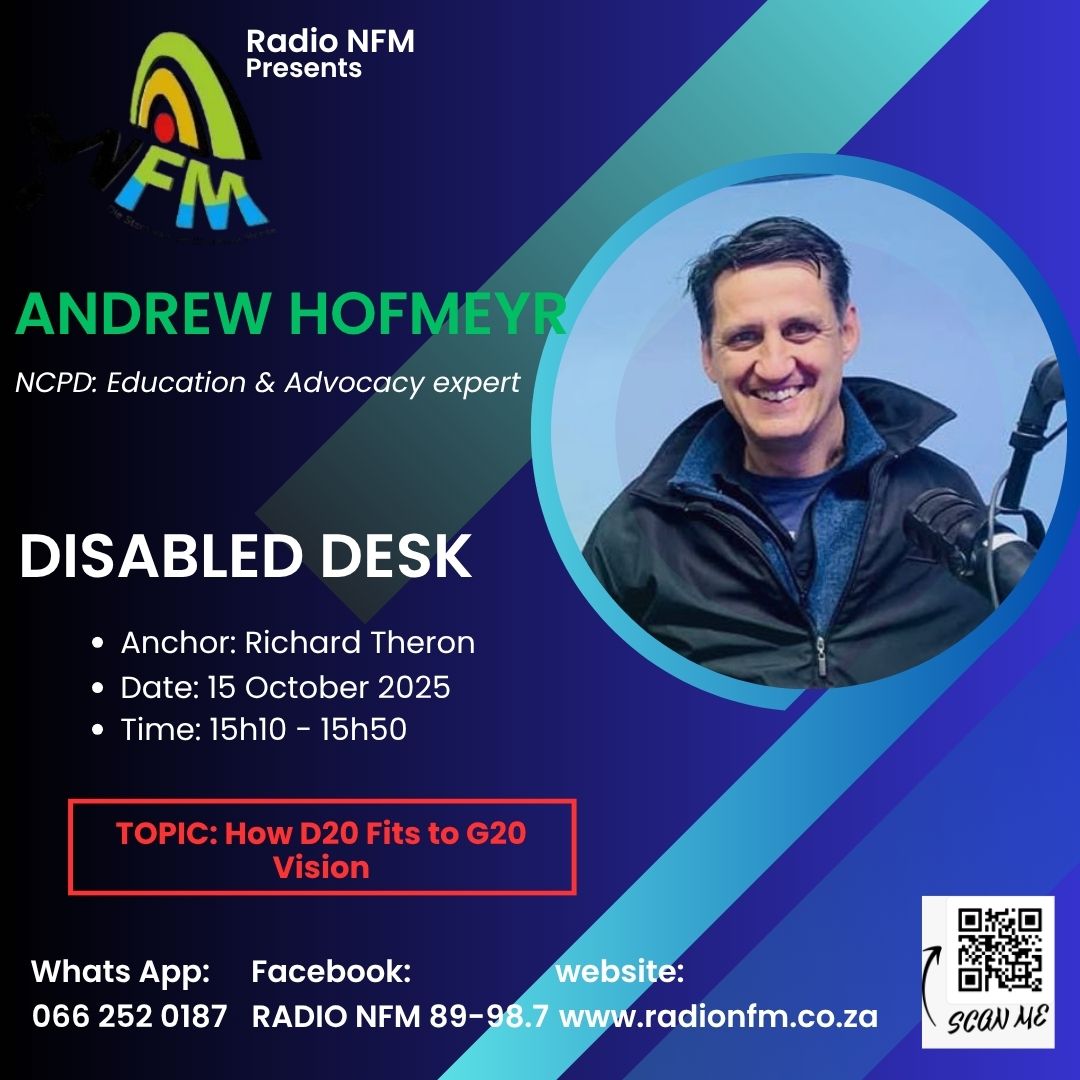

🎧 Listen to the full interview:

Watch the Webinar: